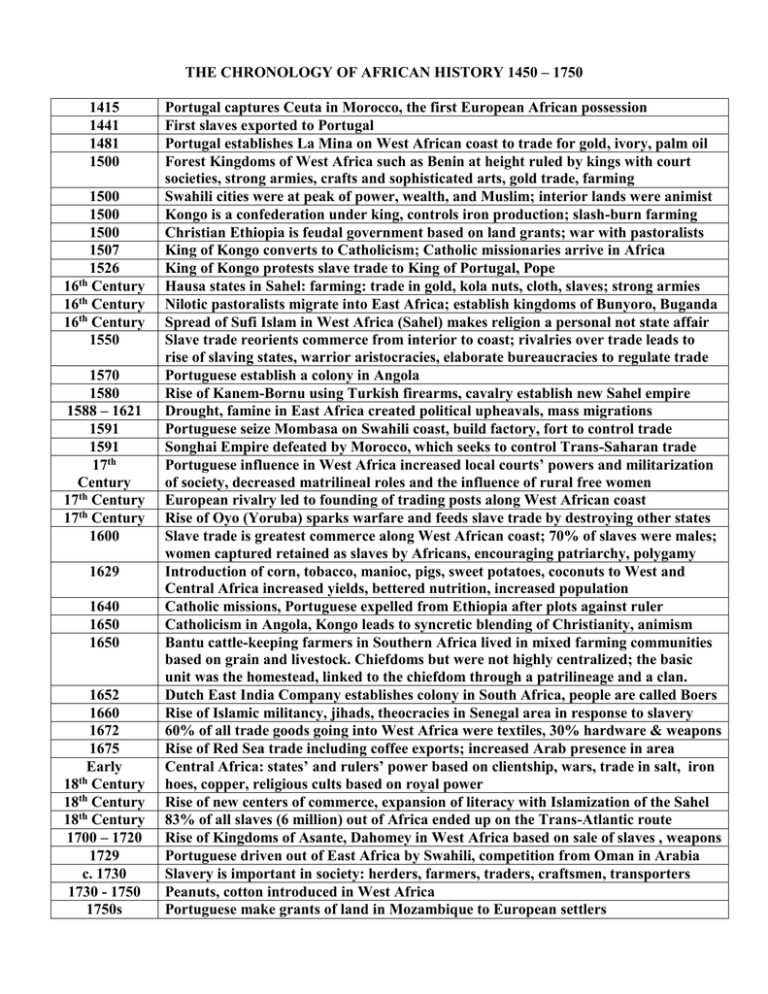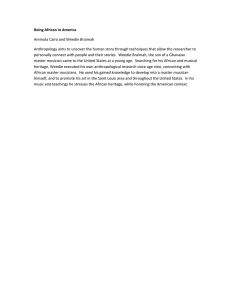THE CHRONOLOGY OF AFRICAN HISTORY 1450 – 1750 1415
advertisement

THE CHRONOLOGY OF AFRICAN HISTORY 1450 – 1750 1415 1441 1481 1500 1500 1500 1500 1507 1526 th 16 Century 16th Century 16th Century 1550 1570 1580 1588 – 1621 1591 1591 17th Century 17th Century 17th Century 1600 1629 1640 1650 1650 1652 1660 1672 1675 Early 18th Century 18th Century 18th Century 1700 – 1720 1729 c. 1730 1730 - 1750 1750s Portugal captures Ceuta in Morocco, the first European African possession First slaves exported to Portugal Portugal establishes La Mina on West African coast to trade for gold, ivory, palm oil Forest Kingdoms of West Africa such as Benin at height ruled by kings with court societies, strong armies, crafts and sophisticated arts, gold trade, farming Swahili cities were at peak of power, wealth, and Muslim; interior lands were animist Kongo is a confederation under king, controls iron production; slash-burn farming Christian Ethiopia is feudal government based on land grants; war with pastoralists King of Kongo converts to Catholicism; Catholic missionaries arrive in Africa King of Kongo protests slave trade to King of Portugal, Pope Hausa states in Sahel: farming: trade in gold, kola nuts, cloth, slaves; strong armies Nilotic pastoralists migrate into East Africa; establish kingdoms of Bunyoro, Buganda Spread of Sufi Islam in West Africa (Sahel) makes religion a personal not state affair Slave trade reorients commerce from interior to coast; rivalries over trade leads to rise of slaving states, warrior aristocracies, elaborate bureaucracies to regulate trade Portuguese establish a colony in Angola Rise of Kanem-Bornu using Turkish firearms, cavalry establish new Sahel empire Drought, famine in East Africa created political upheavals, mass migrations Portuguese seize Mombasa on Swahili coast, build factory, fort to control trade Songhai Empire defeated by Morocco, which seeks to control Trans-Saharan trade Portuguese influence in West Africa increased local courts’ powers and militarization of society, decreased matrilineal roles and the influence of rural free women European rivalry led to founding of trading posts along West African coast Rise of Oyo (Yoruba) sparks warfare and feeds slave trade by destroying other states Slave trade is greatest commerce along West African coast; 70% of slaves were males; women captured retained as slaves by Africans, encouraging patriarchy, polygamy Introduction of corn, tobacco, manioc, pigs, sweet potatoes, coconuts to West and Central Africa increased yields, bettered nutrition, increased population Catholic missions, Portuguese expelled from Ethiopia after plots against ruler Catholicism in Angola, Kongo leads to syncretic blending of Christianity, animism Bantu cattle-keeping farmers in Southern Africa lived in mixed farming communities based on grain and livestock. Chiefdoms but were not highly centralized; the basic unit was the homestead, linked to the chiefdom through a patrilineage and a clan. Dutch East India Company establishes colony in South Africa, people are called Boers Rise of Islamic militancy, jihads, theocracies in Senegal area in response to slavery 60% of all trade goods going into West Africa were textiles, 30% hardware & weapons Rise of Red Sea trade including coffee exports; increased Arab presence in area Central Africa: states’ and rulers’ power based on clientship, wars, trade in salt, iron hoes, copper, religious cults based on royal power Rise of new centers of commerce, expansion of literacy with Islamization of the Sahel 83% of all slaves (6 million) out of Africa ended up on the Trans-Atlantic route Rise of Kingdoms of Asante, Dahomey in West Africa based on sale of slaves , weapons Portuguese driven out of East Africa by Swahili, competition from Oman in Arabia Slavery is important in society: herders, farmers, traders, craftsmen, transporters Peanuts, cotton introduced in West Africa Portuguese make grants of land in Mozambique to European settlers THE CHRONOLOGY OF AFRICAN HISTORY 1750 – 1914 1770s 1795 1795 1805 1807 Muslim, Sufi scholars preach need for religious reform in West Africa; many jihads British seize Cape Colony from the Dutch; results in Boer trek to interior, 1834 - 1850 Exploration of Niger River begins European interest; many more explorers follow Muhammad Ali Khedive of Egypt modernizes nation, military, economy, society British abolish slave trade; coastal trade shifts to tropical products (palm oil, cotton, peanuts); led to peasant revolution in West Africa; rise of African farmers, merchants; in face of rising demand for agriculture products, African societies increase slavery 1814 Church missionary society establishes schools in Sierra Leone to train missionaries, teachers; spread literacy, created new African elites; led to conflict with Muslims 1818 – 1824 Rise of Zulu state under Shaka; his wars create Mfecane, dispersing Ngoni in region 1830 France annexes Algeria; by 1870 there were 130,000 French colonists in Algeria 1830s – 1900s European missions established, converted Africans; many breakaway Christian churches as Africans used Western cultural institutions to resist European domination; Christianity changes African social structures, traditions by insisting on monogamy 1840 Oman moves capital to Zanzibar to better profit, control East African slave trade 1859 First indentured Indian laborers arrive in South Africa due to black labor shortage 1854 Discovery of quinine prevents malaria, allows Europeans to penetrate interior of Africa 1855 – 1913 Emperors unite Ethiopia; creates modern state, army by abolishing feudalism 1869 Suez Canal opened in Egypt; new wealth from trade, expansion of cotton trade allows new irrigation canals, railroads, postal system, rebuilding of Cairo begins 1870 – 1890s Mining of diamonds, gold, copper transform political economy of Southern Africa, commercialized agriculture, started migrant labor to work mines, increased missions, led to conquest of African states. White population increases to one million settlers 1870 – 1898 Rivalry by Germany, France, UK, Italy, Belgium and Portugal to claim Africa 1860s - 1870s Livingstone exploration of Central Africa; Belgians using machine guns, rifles, steam boats create private empire in Congo for King of Belgium to monopolize ivory, rubber 1880s – 1898 Mahdi drives Egyptian, British out of Sudan; create fundamentalist Muslim state Late 1880s Rise of personal empires of traders, porters by Bantu in East Africa using capital from Indian bankers, western firearms; supply ivory, slaves; widespread devastation, misery 1882 British acquire controlling shares in Suez Company; occupy Egypt to protect canal 1884 Berlin Conference requires European nations to occupy lands in Africa they claim 1884 Puritanical Islamic state in Sudan; defeats Egyptians; British invasion crushes, 1898 1885 – 1900 Epidemics kill 90% cattle in Africa; destabilizes societies, heavily impacts population 1890s – 1920s Era of railroad building from coastal ports to interior begins; no unified rail system 1895 French unify West African colonies into one government to promote direct rule 1896 Ethiopians defeat Italian army; Ethiopia, Liberia remain only two independent nations 1899 – 1902 Anglo-Boer War in South Africa leads to British annexation of Boer republics 1899 Portuguese labor law: Africans had a moral obligation to work including corvee labor, wage labor; common throughout most European colonies 1902 British complete Aswan Dam in Egypt; Belgians annex Congo to end king’s cruel rule 1903 UK established protectorates over Nigeria retaining local administration (indirect rule) 1907 Taxation, forced labor, drought in German East Africa led to failed Maji-Maji revolt 1909 African National Congress founded in South Africa 1910 Union of South Africa created as British self-governing dominion; Native Labor Regulation Act, Native Land Act, Immigration Act against blacks, Indians follow THE CHRONOLOGY OF AFRICAN HISTORY 1914 – PRESENT 1914 – 1918 1914 – 1939 1918 1919 1920s 1920s 1920s – 1930s 1920s – 1930s 1920s 1921 – 1940 1928 1929 1930 1931 – 1937 1935 1939 – 1945 1944 1945 – 1970 1948 1948 - 1957 1957 – 1975 1954 1954 – 1964 1955 – 2000 1960 – 1964 1960 – 1993 1966 1967 1960s – 1970s 1960s – 1990s 1970 – 1980 1970s – 1990s 1980s – 1990s 1994 – 2005 World War I includes campaigns in Africa; Africans serve abroad; troops use common language, learned Europeans were not invincible; German colonies become mandates Export of primary products increased five times in value, volume (coffee, cocoa, peanuts); Africans favor farming over working in factories World wide pandemic of the Spanish flu hits African ports, kills millions Nationalist revolt in Egypt eventually leads to British withdrawal; only Suez retained Pan-Africa movement fails, too many African American, West Indian Black leaders Negritude literary movement celebrates accomplishments of African culture, arts Strikes, boycotts, collective action by African workers, rise of socialism, unions Expansion of independent African churches; blend African, Christian traditions; African missionaries spread Christianity to new regions; increased influence of Catholicism First Africans (often urban, traditional elites) elected to lowest legislatures in colonies; Europeans favor specific tribes, regional elites for indirect rule, causes ethnic strife African urban population grows significantly including women Beginning of radical Muslim Brotherhood in Egypt; Egyptian Free Officers’ association Great Depression destroys export markets of colonies, widespread hardship, disruptions Nigeria, UK colony – 20 million people, 386 British officers, 8,000 police (150 Europeans) Founding of African-owned newspapers, youth movements spread anti-colonialism Italy conquers Ethiopia using modern weapons, poison gas World War II; African troops serve with Allies; stimulated independence feelings Brazzaville Accords lead to African representation in French Assembly, reforms Economic growth in Central, South Africa stimulated by export of rare raw minerals, petroleum; extreme nationalism, nationalizations led to foreign capital drying up Apartheid officially becomes policy in South Africa, remains law until 1989 Convention Peoples’ Party (Ghana): mass rallies, boycotts, strikes achieve independence Decolonization begins with Ghana; leaders become revolutionary, alienate West, court Soviet Union; western investment disappears; price of primary commodities drops, little or no development; common occurrence in Africa; Portugal is last nation to decolonize Nationalist leaders in Egypt seizes Suez Canal; UK, France invade; USSR courts Egypt Algerian insurgency leads to independence from France; Mau Mau terrorism in Kenya Civil War in Sudan between Muslim, Arab, northern whites and Black, Christian, animist southerners; similar ethnic strife across continent due to multi-ethnic states Civil War in Congo follows independence as country unprepared for independence; UN, Europeans intervene in Congo to restore peace; UN intervened in other countries to 1999 Rapid urbanization across continent places strain on housing, health, infrastructure Government of Ghana overthrown by military; new civilian government increasingly authoritarian, corrupt; renewed military takeover; common occurrence in Africa Tanzania starts independent socialist development similar to Chinese communism Expansion of African national culture through radio, television increased penetration of international culture; Pan-African festivals develop cultural awareness, exchanges High birth rates, lower mortality led to steep population increases, severely straining national, urban resources, encroaching on fragile environment to feed populations White separatist regime in Rhodesia; guerrilla warfare leads to black, Marxist victory Shortage of money, balance of payment deficits lead to World Bank interventions HIV virus in Southern Africa; ¼ population affected including pregnant women Uneven democratization continues in West, South Africa; little industrial growth




